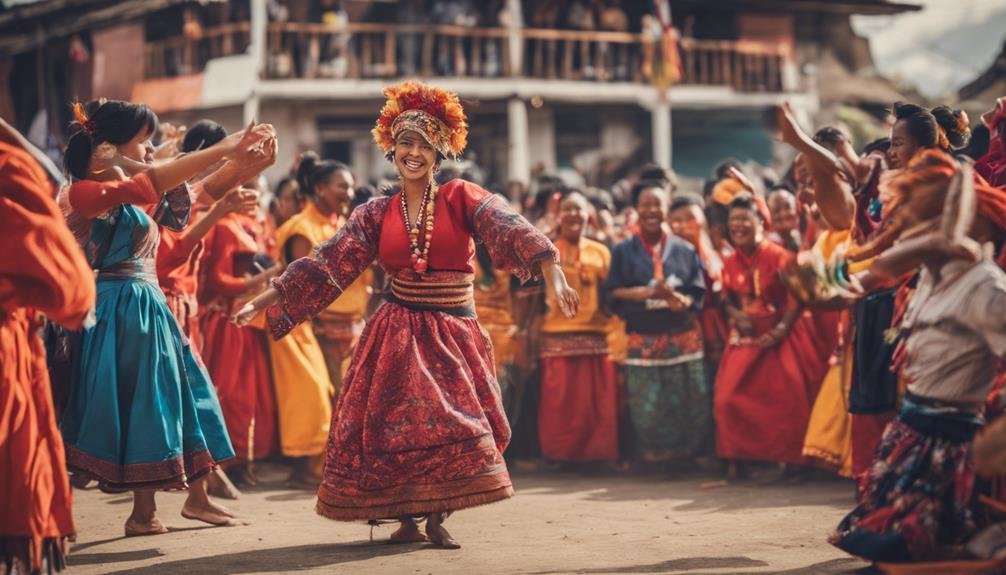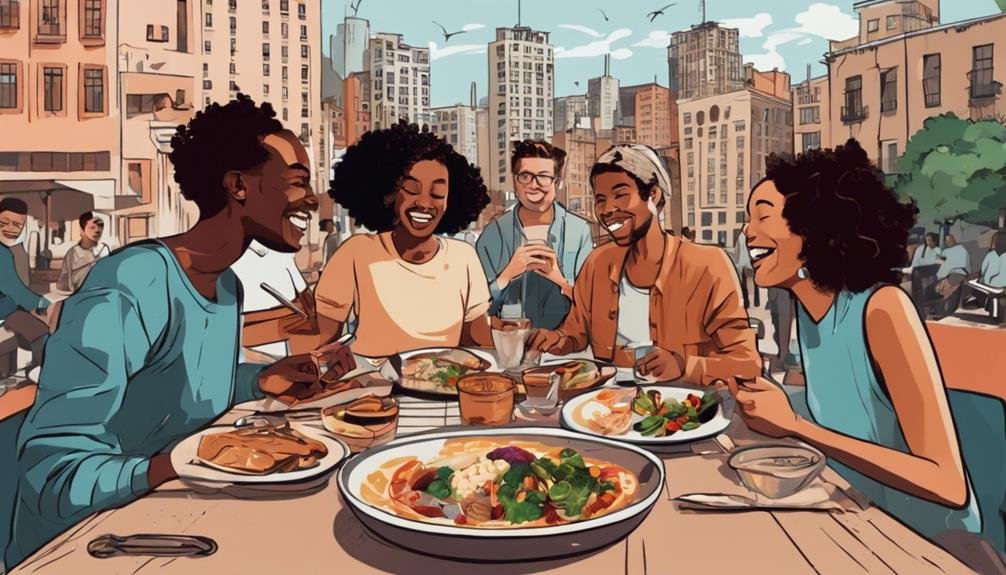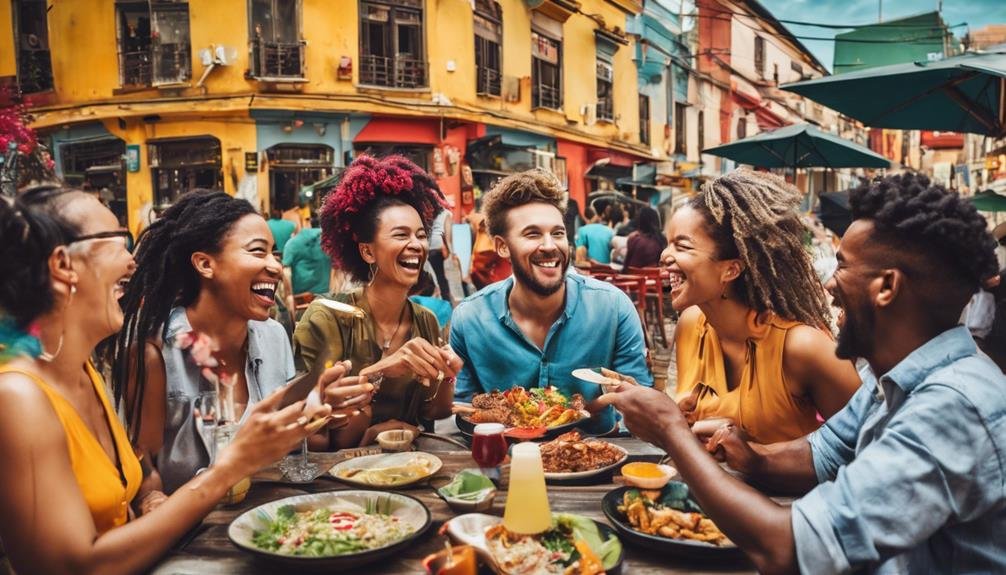When adapting to a new culture abroad, maneuvering unfamiliar customs and social norms can be challenging and enriching. These seven key tips can ease the change and foster meaningful connections in your new environment. Each step is essential to your cultural integration, from immersing yourself in community events to embracing the local language and traditions. So, are you ready to begin this transformative journey and discover the secrets to successful adaptation abroad?
Key Takeaways
- Understand local culture deeply for smoother adaptation.
- Engage in language exchange for effective communication.
- Participate in community events for social integration.
- Build genuine friendships for support and connection.
- Embrace new perspectives with an open mindset.
Understanding Local Culture Deeply
To truly immerse yourself in a foreign culture while abroad, explore thoroughly the local traditions, practices, and societal norms of the host country. Understanding the local culture deeply is essential for successful cultural adaptation. Cultural differences may lead to culture shock, but you can navigate these challenges effectively with a proactive approach with a proactive approach.
Begin by delving into the local culture to grasp its essence. Investigate the dominant religions, traditional cuisine, prevalent gender roles, lifestyle, and social norms. By familiarizing yourself with these aspects, you lay a strong foundation for adapting to the new environment.
Moreover, pay attention to body language, gestures, and communication styles. These nonverbal cues can convey subtle messages and play a significant role in interactions. You demonstrate your willingness to integrate into the local community by learning and respecting these nuances.
In essence, mastering the intricacies of the local culture, including language skills, is key to cultural adaptation. Embrace the opportunity to broaden your horizons and develop a profound appreciation for the richness of diversity.
Learning Local Language Skills
Learning the local language skills enhances cultural immersion and communication effectiveness, making it essential for successful adaptation abroad. When you find yourself in a host country, adapting to a new language differs from just understanding the culture; it requires active participation.
Basic language skills, such as greetings and common phrases, are vital for daily interactions and help you easily navigate various situations. Engaging in language exchange groups can provide opportunities to practice conversational skills, which are key to improving language proficiency.
Immersing in Community Events

When you immerse yourself in community events abroad, you gain firsthand benefits from participating in traditional festivals, exploring local markets, and attending sporting events. These activities allow you to build strong social connections with locals who share similar passions and interests, ultimately enhancing your cultural understanding and making a positive impact on the community.
Joining events like art exhibitions, music concerts, and food festivals allows you to meet new people, broaden your perspectives, and create meaningful relationships during your cultural adaptation journey.
Event Participation Benefits
Participating in local events and immersing yourself in community gatherings offers invaluable opportunities to deepen your cultural understanding and forge meaningful connections with the people around you.
Traditional festivals provide a firsthand experience of local customs, helping you overcome culture shock and appreciate the cultural richness.
Exploring local markets gives insight into daily life and allows interactions with locals, fostering a sense of belonging.
Attending sporting events can be a common ground to bond with locals and become part of the community.
Volunteering in the community benefits others and aids in building connections, leading to new friendships and a deeper cultural immersion within expat communities.
These interactions contribute to a more fulfilling and enriching experience abroad.
Social Connections Building
Immerse yourself in local community events to cultivate meaningful social connections and deepen cultural engagement abroad. Participating in various activities can build lasting friendships and create a strong support network.
Here are some ways to connect with others and enhance your experience:
- Attend Traditional Festivals: Experience the local culture firsthand by joining traditional celebrations and festivals.
- Explore Local Markets: In vibrant marketplaces, you can connect with vendors, learn about unique products, and engage with the community.
- Volunteer in the Community: Make a positive impact, meet like-minded individuals, and contribute to the local area while building meaningful relationships.
Engaging in community events can lead to valuable social connections and enriching experiences during your time abroad.
Cultural Understanding Enhancement
Enhancing cultural understanding through active participation in community events fosters a deeper appreciation for local traditions and customs. By immersing yourself in traditional festivals like Oktoberfest in Germany, you can overcome cultural shock and adapt to a new environment.
Exploring local markets such as La Boqueria in Barcelona exposes you to authentic cuisine and helps you make cultural adjustments. Attending sporting events like soccer matches in Brazil connects you with the community and provides a sense of belonging.
Volunteering in community projects like beach clean-ups in Australia offers new experiences and a chance to give back to society. Building connections through local events like Diwali celebrations in India allows for a better understanding of different cultures and the creation of meaningful relationships.
Prioritizing New Friendships

To prioritize new friendships while adapting abroad, focus on socializing for genuine connections, and embrace the opportunity to build diverse relationships. Engaging in language exchange groups, attending cultural events, and networking can facilitate meeting like-minded individuals.
Embrace the Cultural Journey
Embarking abroad is an exciting adventure filled with opportunities to explore new horizons. As you adapt to a different environment, it’s essential to embrace the process of cultural adaptation. Understanding local customs and traditions will enrich your experience and help you integrate smoothly into the host country.
Learn the Local Language and Customs
Communication is key to understanding and adapting to a new culture. Studying the local language not only aids in daily interactions but also shows respect for the community. Engaging with locals, participating in cultural traditions, and learning about the norms and etiquette can significantly enhance your cultural immersion.
Build a Support Network
Connecting with locals and other expatriates can provide a sense of community and comfort. Join clubs, attend community events, and engage in conversations to make friends and build relationships. This support network will help you navigate challenges and make your adaptation process smoother.
Be Open-Minded and Flexible
Adapting to a new culture requires flexibility and an open-minded attitude. Embrace the differences and similarities you encounter, and approach every situation with patience and a willingness to learn. This mindset will help you adjust to the new environment and enjoy its diverse experiences.
Respect Cultural Differences
Respecting local customs, traditions, and norms is crucial for successful cultural adaptation. Show appreciation for the host country’s values and practices, and be mindful of cultural etiquette in different situations. This respect fosters positive relationships and eases your integration into the new community.
Focus on Personal Growth and Learning
Living abroad is a unique opportunity for personal growth and learning. Embrace the adventure, explore new interests, and expand your cultural perspectives. By immersing yourself in the local culture and continuously seeking to learn, you’ll improve your adaptation and enrich your overall experience.
Socialize for Connection
Start developing meaningful relationships abroad by actively engaging in language exchange groups and local meetups to build a strong social network. Socializing for connection is essential for cultural adaptation.
Here are some tips to help you prioritize new friendships:
- Attend Language Exchange Groups: Practice the local language while meeting new people.
- Participate in Local Meetups: Connect with individuals from the new culture in a relaxed setting.
- Engage in Networking Events: Build relationships with professionals and locals to expand your social circle.
Embrace Diverse Relationships
Embracing diverse relationships abroad can enrich your cultural experience and foster personal growth. Joining language exchange groups is a great way to meet locals and improve your language skills.
Attending meetups focused on cultural exchange and building friendships can provide valuable insights into the local community. Engaging in networking events allows you to connect with individuals from various backgrounds, expanding your social circle and creating opportunities for cultural exchange.
Being approachable and open to meeting new people is key to building meaningful relationships abroad. These new friendships offer a deeper understanding of the local culture and enhance your overall adaptation experience, making your time abroad more rewarding and fulfilling.
Cultivating an Open Mindset
Cultivating an open mindset toward cultural differences is key to fostering understanding and acceptance. Approaching new experiences with an open mind makes you more likely to appreciate the richness of diverse traditions and values.
Here are three essential ways to cultivar your mindset:
- Embrace New Perspectives: By being receptive to different viewpoints, you can broaden your cultural awareness and challenge your preconceptions.
- Respect Traditions and Values: Understanding and respecting a culture’s traditions and values can help you navigate interactions with empathy and sensitivity.
- Cultivate Empathy: Developing empathy for others’ customs and practices is vital for enhancing cultural adaptation. It allows you to connect more deeply with meaningful relationships within the new culture.
Engaging in Expat Communities

Engaging with expat communities provides valuable support, guidance, and a sense of belonging in a new country. These communities serve as a vital lifeline for individuals adjusting to the challenges of living abroad.
By joining expat groups, you can access a wealth of cultural insights and insider knowledge on adapting to your new environment. Expat communities often organize social events, language exchanges, and cultural outings, creating opportunities for you to connect with like-minded individuals and broaden your social circle.
Moreover, interacting with fellow expats allows you to share experiences, tips, and resources, fostering a supportive environment where everyone helps each other acclimate to the unfamiliar surroundings. These connections can lead to lasting friendships, providing a strong support network that eases the shift into a new culture.
Embracing expat communities enhances your cultural adjustment and enriches your overall experience abroad.
Embracing the Time Factor
Entering a new cultural environment requires a patient and gradual adjustment period, with the duration and intensity varying for each individual. Embracing the time factor is important for successful cultural adaptation. Here are three key aspects to keep in mind:
- Allow for Immersion: Allowing yourself time to immerse yourself in the new culture enables a deeper understanding of cultural norms and values. It also allows you to observe, learn, and adapt comfortably.
- Practice Patience: Cultural adaptation is a process that can’t be rushed. Patience is vital as you navigate the adjustment period. Rushing the shift may result in feeling overwhelmed or disconnected from the new environment.
- Gradual Transformation: Embracing the time factor facilitates a gradual adjustment. By taking small steps and being patient, you can adapt more effectively to your new surroundings’ cultural nuances and societal expectations. Remember, cultural adaptation is a journey, not a race.
How Can I Use Your Tips for Cultural Adaptation to Overcome the Main Challenges Abroad?
When facing the main challenges in cultural adaptation abroad, it’s important to approach the experience with an open mind and willingness to learn. By following our tips for the cultural station, such as learning the language, immersing yourself in local customs, and seeking out support from locals, you can easily overcome these challenges.
Conclusion
To sum up, embracing cultural adaptation abroad is like planting seeds in foreign soil—it requires patience, nurturing, and a willingness to grow.
By delving deep into local traditions, forming new connections, and immersing yourself in community events, you can become more understanding and empathetic.
Remember, just like a garden, the more you invest in your cultural adaptation journey, the more vibrant and fulfilling your experience will become.
Happy exploring!
FAQs
1. How Will You Adapt to Overseas Culture?
To adapt to overseas culture, immerse yourself in the local language for better communication.
- Explore new foods to embrace different culinary traditions.
- Understand social customs and cultural norms to navigate interactions smoothly.
- Incorporate daily routines that align with the local way of life.
- Build interpersonal connections with locals and fellow expats for support and insights.
- Embracing these aspects will help you integrate into the new culture effectively and make the most of your overseas experience.
2. What Are the Strategies for Cultural Adaptation?
To adapt culturally, dive deep into language immersion, culinary delights, and social connections.
- Embrace local norms, stay open-minded, and absorb customs.
- Engage in conversations, taste traditional dishes, and participate in community events.
- Immerse yourself in the culture, building friendships and blending in seamlessly.
3. What Are the 4 Stages Leading to Cultural Adaptation?
The four stages of cultural adaptation involve experiencing cultural shock, maneuvering an adjustment process, progressing through integration stages, and culminating in cultural assimilation.
- You start with the Honeymoon stage, which is full of excitement. Challenges in the Frustration/cultural confrontation stage lead to growth.
- As you enter the Cultural Adjustment and Adaptation stage, comfort sets in. Finally, the Acceptance stage brings a sense of belonging akin to a second home.
4. What Are the Four Cultural Adaptation Strategies?
When adapting to a new culture, consider assimilation, separation, integration, and marginalization. Language immersion enhances understanding, while cultural awareness fosters respect—social integration and emotional resilience aid in adapting smoothly.
Supportive Article
Cultural Shock Vs. Cultural Adaptation

